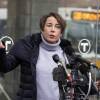Updated at 1:43 p.m.
Andrea Campbell, the former Boston City Councilor who made a strong run for mayor in 2021, announced Wednesday that she’s seeking to become Massachusetts’ next attorney general, linking her vision for the job to her own tumultous and traumatic childhood.
"I became a lawyer because I was often the one who got the calls," Campbell, 39, said during a campaign kickoff in Dorchester's Codman Square. "I felt ill equipped to deal with lawyers. I got the calls because I was the next of kin and the sister. And so I went to law schol so I did not feel ill equipped to engage with lawyers."
Campbell’s mother died in a car accident when Campbell was an infant, as the family traveled to visit Campbell’s father in prison. She and her two brothers were in the foster care system for some of their formative years, and both brothers eventually spent time in prison as well. Campbell’s twin brother, Andre, died at the age of 29 while being held in pretrial detention by the state.
Campbell, in contrast, attended Boston Latin School, Princeton and law school at UCLA before beginning her legal career. She served as legal counsel to former Gov. Deval Patrick and went on to become the first Black woman elected president of the Boston City Council.
"I became a public servant because I firmly believe that everyone should have access to justice and opportunity," Campbell added. "I've dedicated my entire life for fighting for greater opportunity and equity, and that's exactly what I'll do as the next attorney general of Massachusetts. Because the attorney general is not just the top chief law enforcement officer in this state — the attorney general must be an advocate for fundamental change and progress."
More Politics
Campbell expanded on that idea later in her remarks.
"You don't have to tell me that crime does not affect all of us equally," she said. "COVID has not affected all of us equally. ... Seniors, of course, are feeling left out. Those in our LGBTQ+ community desperately still need support. And people of color, and especially Black residents, absolutely are dealing with every inequity that you can imagine.
"I'm done talking about it. This office has the resources, the talent, to absolutely level the playing field and change that."
That framing echoed Campbell's mayoral campaign, in which she spoke frequently of a desire to understand and transform the systems that led her and her brother Andre's lives to take such divergent paths. It also harkened back to her push for police reform as a Boston City Councilor, which preceded the upsurge of interest in rethinking the criminal justice system that followed the murder of George Floyd.
In Dorchester, Campbell vowed to continue pursuing criminal justice reform if she's elected attorney general.
"Everyone of course should feel safe in their neighborhoods, in their communities, and in their homes," she said. "I was very proud to pass funding as a councilor to ensure that our police department got more funding for community policing. ... But I also firmly believe that public safety is also transparency and accountability. No one should be abovle the law."
Campbell's Wednesday campaign schedule also includes stops in Worcester and Springfield.
No woman of color has previously been elected to statewide office in Massachusetts. The 2022 election cycle now includes several candidates who could break that barrier, including Campbell, Democratic gubernatorial candidates Danielle Allen and Sonia Chang-Díaz, Democratic secretary of state candidate Tanisha Sullivan and Republican secretary of state candidate Rayla Campbell.
Maura Healey, the current attorney general, blew open the race for her seat when she announced in January that she would seek the Democratic nomination for governor rather than a third term.
Campbell joins labor attorney Shannon Liss-Riordan and Quentin Palfrey, an alum of the Biden and Obama administrations, in the Democratic race to replace Healey. A recent survey from the MassINC Polling Group showed Campbell, who had not yet announced her candidacy, leading the pack in a hypothetical primary matchup by a healthy margin. But a majority of respondents — 54% — either said they didn’t know who they would vote for or declined to answer.
Along with current Boston Mayor Michelle Wu, Campbell was one of two Boston mayoral candidates to enter that race when it seemed likely that then-Mayor Marty Walsh would seek re-election. A MassINC-GBH News poll released in September 2020, before Campbell announced her candidacy, showed Walsh receiving support from 46% of Boston voters, compared to 23% for Wu and just 4% for Campbell.
Walsh ultimately did not seek reelection after becoming labor secretary in the Biden administration. As the campaign progressed, Campbell gained considerable ground, and in the end she finished third in the September 2021 preliminary election, falling less than 3,000 votes shy of second place–finisher Annissa Essaibi George. While Campbell failed to advance, her steady rise impressed many political observers.
Essaibi George, who served with Campbell on the Boston City Council, attended her kickoff Wednesday. So did Lydia Edwards, another former council colleague of Campbell's who was recently elected to the Massachusetts State Senate.
This story was updated with details from Campbell's campaign kickoff event.








